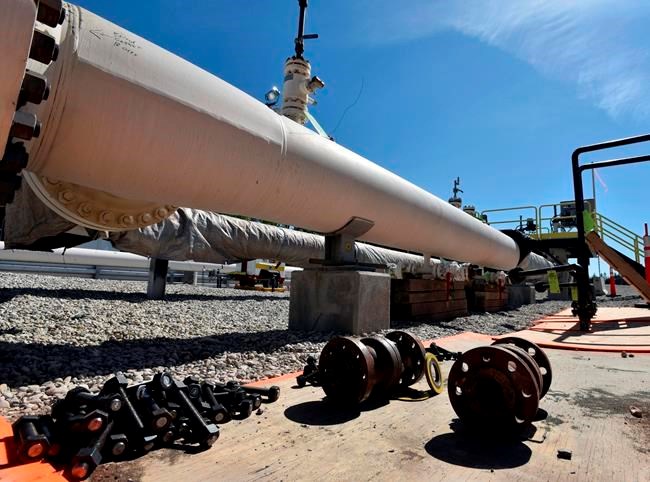WASHINGTON — Heavy spring flooding has made Line 5 an "imminent threat" to Lake Superior and a key Indigenous watershed, lawyers argued Tuesday in an emergency motion to shut down the controversial cross-border pipeline.Â
Lawyers for the Bad River Band of the Lake Superior Chippewa filed their emergency motion Tuesday and asked District Court Judge William Conley to make a decision on it before the end of the week.Â
The motion comes after a joint status report by both the band and the pipeline's owner, Enbridge Inc., acknowledged extensive erosion last month that has brought the edges of the Bad River ever closer to the pipeline.Â
That erosion has only continued with "alarming rapidity" in recent days, the motion says, with the river less than five metres away in several spots — and just 3.5 metres away in one specific area.
"Erosion continues to progress … and important factors suggest that further bank loss could be significant, resulting in the exposure and rupture of the pipeline," it reads.
"These circumstances present an imminent threat to the Bad River watershed and Lake Superior, and hence to the rights of the band and the public, and they warrant immediate action by this court."Â
In a statement, Enbridge said it was "extremely disappointed" to see the motion, which it was not expecting, and played down the potential threat of a breach.Â
Enbridge and band officials toured the area on Monday and saw no evidence of an emergency, the company said.Â
"The pipe is not exposed, it is completely covered by multiple feet of soil; there is no pipeline safety issue and certainly no cause for alarm," said spokesperson Juli Kellner.Â
"To be clear, the band’s leadership seems determined to shut down this piece of critical, North American energy infrastructure regardless of who will be impacted by their actions."Â
Enbridge has repeatedly offered plans to shore up the riverbank and install an additional valve, but the band insists there's nothing that can be done. "Nothing could be further from the truth," Kellner said.Â
"A disruption in any one part of Line 5 has an impact on the entire pipeline, effectively terminating Line 5’s operations in whole. This presents severe consequences for people and industries in the United States and Canada."
The two sides have been in court since 2019 as the band tries to compel Enbridge to not only reroute Line 5 around its traditional territory, but to shut it down in the meantime.
Enbridge has already agreed to the relocation project, and that work is well underway. The dispute now revolves around whether the company should be required to shut down and purge the section of line on Bad River land in the meantime.Â
Late last year, Conley — having already rejected calls to shut down the pipeline immediately — ordered both parties to submit contingency plans in the event the risk of a rupture grew too great.
Neither plan was triggered by the flooding, which began April 11 after an abrupt spring melt and persisted for days, worsened by heavy rains, until the floodwaters finally receded fully on April 23, the report says.
Conley has already indicated that he's reluctant to shut the pipeline down wholesale, citing the potential economic impact in both Canada and the U.S.Â
The motion suggests Bad River's lawyers believe the current circumstances might change his mind.Â
"The band is sensitive to the court's economic concerns about enjoining the pipeline," it reads.Â
"The far graver threat at present is of a rupture that not only would shut down Line 5 but would devastate the Bad River watershed and Lake Superior in the process."
Environmental concerns about Line 5 have long been top of mind in Wisconsin, where the pipeline runs directly through the Bad River Reservation, more than 500 square kilometres of pristine wetlands, streams and wilderness.
Enbridge has plans for a 66-kilometre detour of Line 5 around the reservation, which are already more than two years along.
Late last month, the United Nations Permanent Forum on Indigenous Issues, a UN advisory body, recommended that Canada rescind its support for the pipeline, citing the potential risk of a disaster in the Great Lakes.
The forum called Line 5 "a real and credible threat to the treaty-protected fishing rights of Indigenous Peoples in the United States and Canada."
Line 5 is also under legal siege in neighbouring Michigan, where the state wants the line shut down for fear of a disaster in the Straits of Mackinac, the ecologically delicate area where it crosses beneath the Great Lakes.
Business groups and chambers of commerce on both sides of the border, provincial governments and Ottawa have all rallied behind Enbridge in its effort to portray Line 5's survival as a mission-critical matter of continental energy security.
Allies have argued in court filings as well as public forums that Line 5 is a vital source of energy for several Midwestern states and an essential link for 91Ô´´ refineries that fuel some of Canada's busiest airports.
This report by The 91Ô´´ Press was first published May 9, 2023.
James McCarten, The 91Ô´´ Press



